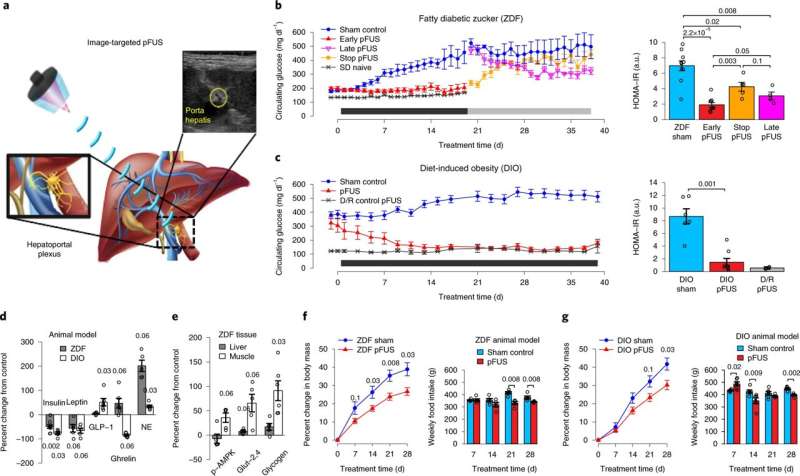Treating diabetes without drugs? Novel non-pharmacologic treatments are on the horizon

A multi-institutional team including Yale School of Medicine (YSM) has demonstrated the ability to use ultrasound to stimulate specific neurometabolic pathways in the body to prevent or reverse the onset of type 2 diabetes in three different preclinical models. The team, which includes the lab of Raimund Herzog, MD, MHS, at YSM, reported its findings in Nature Biomedical Engineering.
The team of investigators is now conducting human feasibility trials with type 2 diabetic subjects, moving medicine closer to the day when diabetes is no longer monitored and managed with blood sugar tests, insulin injections, and drug treatments. The goal of the studies is to provide a long-lasting treatment for people with type 2 diabetes to alleviate and potentially reverse the disease.
Type 2 diabetes affects millions of people worldwide. The long-term condition results in too much sugar circulating in the bloodstream. Diabetes is a major cause of blindness, kidney failure, heart attacks, stroke and lower limb amputation.
Herzog, associate professor (endocrinology) in the Department of Internal Medicine at YSM and a member of the NIH-funded Yale Diabetes Research Center, and his lab tested the magnitude of the effect of ultrasound treatment on blood glucose. "Even though we already have a large variety of anti-diabetic medications available to us to treat high glucose levels, we are always looking for new ways to improve insulin sensitivity in diabetes," Herzog said.
"Unfortunately, there are currently only very few drugs that lower insulin levels," Herzog added. "If our ongoing clinical trials confirm the promise of the preclinical studies reported in this paper, and ultrasound can be used to lower both insulin and glucose levels, ultrasound neuromodulation would represent an exciting and entirely new addition to the current treatment options for our patients."
The reported findings represent a significant milestone in the field of bioelectronic medicine, which is exploring new ways to treat chronic diseases such as diabetes using novel medical devices to modulate the body's nervous system. For the past six years, GE Research has been developing a novel, non-invasive stimulation technique that uses ultrasound to stimulate specific neural pathways within organs that are associated with disease.
Following the reported preclinical studies, the collaborators have been engaged in additional studies that investigate the effects of alternate dosing such as the type of ultrasound pulse and duration of treatment. The team is expected to report on those studies later this year.
More information: Victoria Cotero et al, Stimulation of the hepatoportal nerve plexus with focused ultrasound restores glucose homoeostasis in diabetic mice, rats and swine, Nature Biomedical Engineering (2022). DOI: 10.1038/s41551-022-00870-w




















